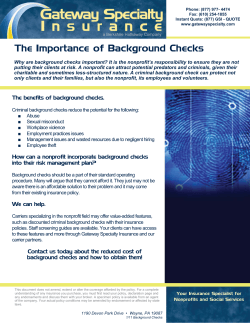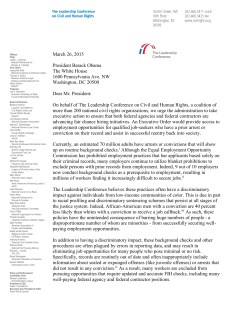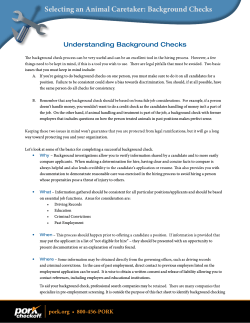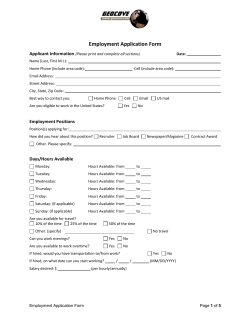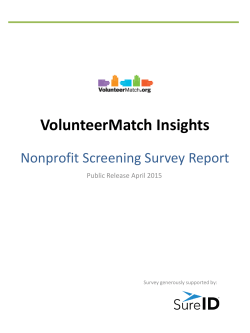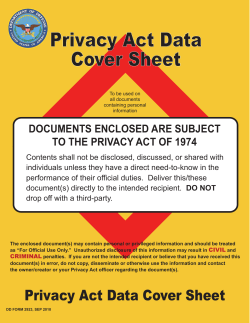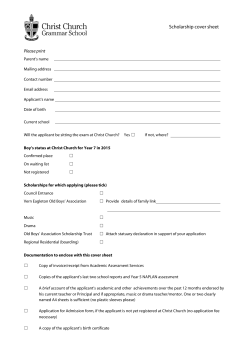
Background checks thwart fraud, but be careful
Background checks thwart fraud, but be careful By Sean C. Griffin, CPA, MBA Councilor, Buchanan & Mitchell, P.C. It's important to take steps to prevent employee fraud before a new worker walks in your door. Why? Once the new person is hired, it may be too late: Sales employees will have access to new and used cars. Parts department workers will be able to order anything that can be put on a vehicle. F&I employees will be surrounded by customers' credit information. No matter how strong your internal controls, you need to "begin at the beginning" with complete employee background checks. It's one of the best ways to protect your business and your customers, although you still need to be careful with your final decision. Follow the rules Background checks need to be performed without violating privacy rights and other laws, which vary from state to state and evolve frequently. Be sure to consult an attorney before beginning your quest. The Fair Credit Reporting Act, for instance, defines the standards for using credit checks in employment screening. Before requesting a credit (or "consumer") report, an employer must: • • Disclose clearly and conspicuously to the employee or applicant (in a separate document that doesn't refer to other subjects) that a report may be requested, and Obtain the employee's or applicant's written consent. In many states only law enforcement agencies, financial institutions, debt collectors, and insurance and surety businesses can check credit reports. The Electronic Communications Privacy Act does, however, permit credit history inquiries by other types of employers if they're related to a "bona fide occupational requirement" of a particular position or group of employees. These limited exceptions exist for jobs that involve the following: • • • • Access to personal, financial or confidential information; trade secrets; or national or state security information, Unsupervised access to cash or certain assets valued at $2,500 or more, Bonding or security required by state or federal law, and Signatory power over business assets of $100 or more per transaction. An exception also exists for managerial duties that involve setting the direction or control of the business. Beware of other limitations The Driver's Privacy Protection Act regulates how information from state motor vehicle department records can be released and shared. The departments generally will make the job candidate's driving records available, usually for a small fee. Most schools, however, won't release records without the student's consent, and some schools will release records only to the student. You also may need the candidate's consent before performing a criminal background check. In general, it's illegal to inquire about arrests - you can inquire only about convictions. Choose an agency or investigator carefully An employer may personally conduct a background check, and free general advice is available from the Small Business Administration and other organizations. But often the more convenient approach is to hire an outside agency such as a background check vendor, private investigator or credit agency. Choose your background check company carefully, however, and know what you're getting. There are many start-up companies in this field, and a less experienced or thorough company might search, for example, for a criminal history only in one or two states where an applicant has lived. Most criminal records are available by county and then reported to the state. Thorough agencies generally check all of the counties in which someone has lived, worked or gone to school over the last 10 years. Also be wary of Web-based companies that offer "instant" checks. There isn't one national database that contains all federal and state convictions. Finding criminal records can be a fragmented task across multiple jurisdictions and courthouses. Furthermore, many e-businesses offer low rates for public record searches, but the advertised rates may be deceiving; the more jurisdictions you want to search, the more you're likely to pay. It's your responsibility You have a responsibility to protect your business and your customers from fraudulent behavior in your workplace. A misstep in hiring new employees can adversely affect your daily operations, your bottom line and your reputation. Sean C. Griffin, CPA, MBA is an Audit Manager with CBM. His eight years of experience includes audits, reviews, tax preparation, and research and planning services. He is involved in several industry concentrations including automotive dealerships, construction companies, and not-forprofit organizations. Contact Sean at sgriffin@cbmcpa.com or 301.986.0600.
© Copyright 2025

